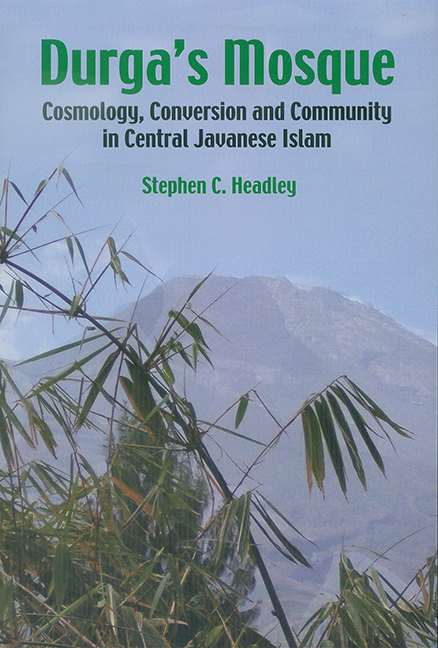Book contents
- Frontmatter
- Contents
- List of Figures
- List of Tables
- Preface
- Acknowledgements
- Introduction: Cosmology, Conversion and Community in Javanese Islam
- PART I THE SOCIOLOGY AND PRACTICE OF RELIGION IN CENTRAL JAVA
- 1 Of Palaces and Placentas: The Praxis of Javanese Kindred
- 2 The Village “Kingdom”: The Bed of Sri and the Realm of Sadana
- 3 Village Goddesses, Their Hierarchy and Clientele
- 4 Deterritorialization: The End of Peasant Livelihood
- PART II RECONSTRUCTION OF LOCAL RELIGIOUS HISTORY
- PART III INVOKING THE COSMOS, MAGNIFYING ALLAH: STRUCTURING A LANDSCAPE IN THE SEVENTEENTH TO NINETEENTH CENTURIES
- PART IV COSMOLOGY, CONVERSION AND COMMUNITY IN CENTRAL JAVANESE ISLAM TODAY
- Bibliography
- Index
- About the Author
1 - Of Palaces and Placentas: The Praxis of Javanese Kindred
from PART I - THE SOCIOLOGY AND PRACTICE OF RELIGION IN CENTRAL JAVA
Published online by Cambridge University Press: 21 October 2015
- Frontmatter
- Contents
- List of Figures
- List of Tables
- Preface
- Acknowledgements
- Introduction: Cosmology, Conversion and Community in Javanese Islam
- PART I THE SOCIOLOGY AND PRACTICE OF RELIGION IN CENTRAL JAVA
- 1 Of Palaces and Placentas: The Praxis of Javanese Kindred
- 2 The Village “Kingdom”: The Bed of Sri and the Realm of Sadana
- 3 Village Goddesses, Their Hierarchy and Clientele
- 4 Deterritorialization: The End of Peasant Livelihood
- PART II RECONSTRUCTION OF LOCAL RELIGIOUS HISTORY
- PART III INVOKING THE COSMOS, MAGNIFYING ALLAH: STRUCTURING A LANDSCAPE IN THE SEVENTEENTH TO NINETEENTH CENTURIES
- PART IV COSMOLOGY, CONVERSION AND COMMUNITY IN CENTRAL JAVANESE ISLAM TODAY
- Bibliography
- Index
- About the Author
Summary
INTRODUCTION
The island of Java resembles Britain in possessing an unusual insularity. Situated at the crossroads of the maritime trade routes between China to the north and India and the Muslim and Mediterranean world to the west, this society has participated in international networks and absorbed foreign influences for over two thousand years. Nonetheless, once one leaves the cosmopolitan north coast, Java “Javanizes” into a “deep Asia”. A new kind of cultural coherence emerged during 350 years of Dutch colonialism. What changed? Since the Dutch first sought spices in the archipelago in the 1590s, the majority of the Javanese population, more than a hundred million people today, have converted to Islam. This volume chronicles that conversion as seen from one region, just north of Surakarta in Central Java: the sacred forest of Krendawahana where Javanese kings from Surakarta offered blood sacrifices to the goddess Durga.
Why choose Durga's forest as an historical benchmark? From at least the eighteenth century the two rulers of Surakarta, the Susuhunan and the Mangkunagaran prince, invoked Durga at her tertre for the well being of their kingdoms. Most likely cults of this kind existed in other forests with the same or similar toponyms nearby earlier kingdoms elsewhere in Java. The invocations, and the mythology that accompanied the offerings made in that forest, created a richly woven fabric of belief that survived the arrival of Islam at the beginning of the nineteenth century. While elsewhere in the countryside the massive development of Islam has left few traces of its spread, the proximity of the cult of Durga in Krendawahana, simply because of its urban and royal patronage, and the mythological fame of its cultic site already found in the first book of the Indian epic, the Mahābhārata (Ādiparva) of the shadow puppet theatre, permits a more detailed description of Islam's advance.
The construction of this new religious social space did not take place in an economic and political vacuum. Although the economic, political, and social changes that have swept through the region are not our focus here, they need to be sketched out.
- Type
- Chapter
- Information
- Durga's MosqueCosmology, Conversion and Community in Central Javanese Islam, pp. 57 - 97Publisher: ISEAS–Yusof Ishak InstitutePrint publication year: 2004

